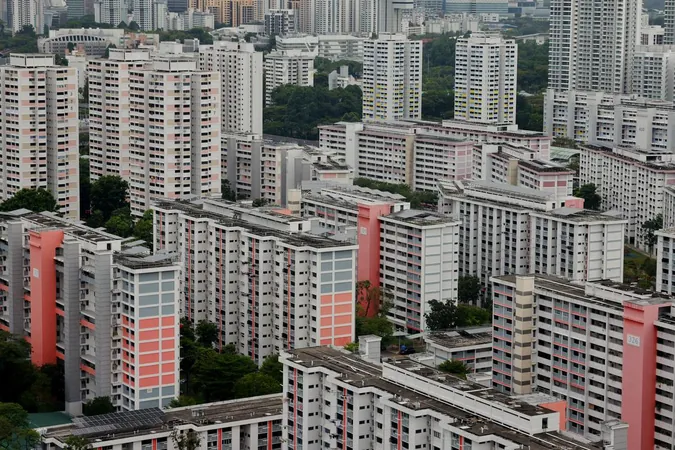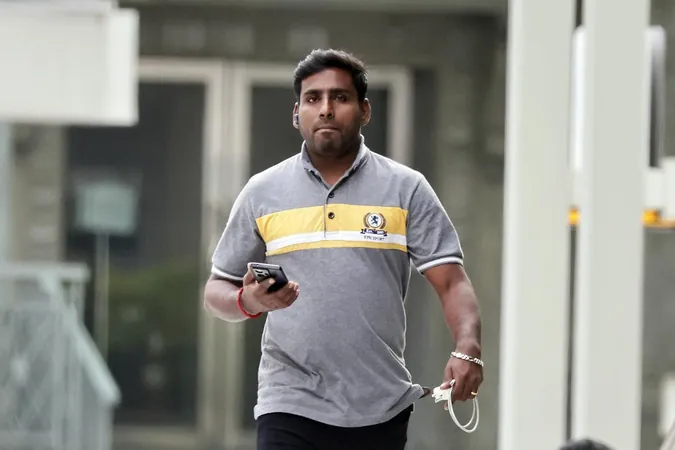
The New Vers Scheme: A Game Changer for Singapore's Aging HDB Estates?
2025-08-13
Author: Siti
SINGAPORE'S HOUSING LANDSCAPE: A FRESH FOCUS
In a significant shift in urban planning, the Singapore government is setting its sights on the Voluntary Early Redevelopment Scheme (Vers) as it prepares to roll out this innovative program in select sites throughout the first half of the 2030s. National Development Minister Chee Hong Tat revealed these ambitious plans during a recent interview, confirming that there are no further Selective En bloc Redevelopment Scheme (Sers) projects on the horizon.
Understanding the Sers vs. Vers Dichotomy
To appreciate Vers, it’s essential to grasp the existing Sers program. Under Sers, older Housing Board (HDB) blocks are chosen by authorities for compulsory demolition and redevelopment. Homeowners are compensated based on their flats' market value and offered a new flat with a fresh 99-year lease, along with financial incentives such as a $30,000 grant.
Historically, about 5% of HDB flats are eligible for Sers, with a total of 80 projects completed since 1995, and two currently underway.
Unlocking the Benefits of Vers
Vers proposes a novel approach for homeowners of flats aged 70 years and older. It empowers these owners with the ability to vote on whether to sell their homes back to the government before lease expiration. This strategic solution aims to combat lease decay—where property values erode as the end of a 99-year lease nears.
Initially unveiled by former Prime Minister Lee Hsien Loong at the 2018 National Day Rally, Vers represents a thoughtful method for systematically redeveloping older HDB towns over the next two to three decades. Minister Chee confirmed that the current government term will focus on developing the Vers framework, including site identification, compensation packages, and ensuring sufficient housing supply for relocating families.
What to Expect from Vers?
Details regarding replacement flats for Vers residents remain unclear, including potential lease options and the voting threshold required to initiate a Vers project. However, Minister Chee expressed a desire for the new homes to be situated close to the existing residences of the affected residents.
Unlike Sers, which offers higher financial compensation for newer estates, the Vers program will inevitably present less financial upside due to the older age of the flats involved. The aim is to make the program equitable for current homeowners while ensuring sustainability for future generations.
Potential Areas for Vers Implementation
Minister Chee highlighted numerous older estates built rapidly in the 1970s and 1980s to address housing shortages. Notable towns include Ang Mo Kio, Bedok, Tampines, and Yishun, with thousands of new flats constructed during this boom.
For instance, Ang Mo Kio saw 356 blocks built, yielding approximately 39,600 new flats, while Bedok and Tampines followed suit with 419 and 494 new blocks respectively. Some of Singapore's oldest 99-year lease flats, dating back to as early as 1962, are also included in this discussion, notably in Tanjong Rhu and Tiong Bahru.
Future Prospects for Vers
Before launching, authorities plan to gather public opinions on Vers, with an initial rollout in select sites in the early 2030s. By the late 2030s, the plan is to expand Vers to other estates across Singapore.
The Decline of Sers Projects
Curiously, the Ministry of National Development has indicated that no further Sers projects will emerge due to a lack of eligible sites, as most with significant redevelopment potential have already been selected. The last ongoing Sers project, announced in April 2022 for Blocks 562 to 565 in Ang Mo Kio Avenue 3, aims to accommodate 606 households and is expected to complete by late 2027.
As the Vers scheme comes to fruition, it promises to reshape Singapore's housing landscape, offering solutions for aging estates while addressing the needs of current residents.


 Brasil (PT)
Brasil (PT)
 Canada (EN)
Canada (EN)
 Chile (ES)
Chile (ES)
 Česko (CS)
Česko (CS)
 대한민국 (KO)
대한민국 (KO)
 España (ES)
España (ES)
 France (FR)
France (FR)
 Hong Kong (EN)
Hong Kong (EN)
 Italia (IT)
Italia (IT)
 日本 (JA)
日本 (JA)
 Magyarország (HU)
Magyarország (HU)
 Norge (NO)
Norge (NO)
 Polska (PL)
Polska (PL)
 Schweiz (DE)
Schweiz (DE)
 Singapore (EN)
Singapore (EN)
 Sverige (SV)
Sverige (SV)
 Suomi (FI)
Suomi (FI)
 Türkiye (TR)
Türkiye (TR)
 الإمارات العربية المتحدة (AR)
الإمارات العربية المتحدة (AR)